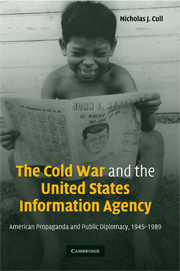 The Cold War and the United States Information Agency
The Cold War and the United States Information Agency Book contents
- Frontmatter
- Contents
- List of Illustrations
- Preface
- Abbreviations
- THE COLD WAR AND THE UNITED STATES INFORMATION AGENCY
- Prologue
- 1 Getting the Sheep to Speak
- 2 Mobilizing “the P-Factor”
- 3 In the Shadow of Sputnik
- 4 Inventing Truth
- 5 Maintaining Confidence
- 6 “My Radio Station”
- 7 Surviving Détente
- 8 A New Beginning
- 9 From the “Two-Way” Mandate to the Second Cold War
- 10 “Project Truth”
- 11 Showdown
- Epilogue
- Conclusion
- Selected Bibliography
- Index
- Plate section
10 - “Project Truth”
The First Reagan Administration, 1981–84
Published online by Cambridge University Press: 05 February 2015
- Frontmatter
- Contents
- List of Illustrations
- Preface
- Abbreviations
- THE COLD WAR AND THE UNITED STATES INFORMATION AGENCY
- Prologue
- 1 Getting the Sheep to Speak
- 2 Mobilizing “the P-Factor”
- 3 In the Shadow of Sputnik
- 4 Inventing Truth
- 5 Maintaining Confidence
- 6 “My Radio Station”
- 7 Surviving Détente
- 8 A New Beginning
- 9 From the “Two-Way” Mandate to the Second Cold War
- 10 “Project Truth”
- 11 Showdown
- Epilogue
- Conclusion
- Selected Bibliography
- Index
- Plate section
Summary
We are determined to stop losing the propaganda war.
Ronald Reagan, 11 January 1982.He was the ultimate image professional. Sports announcer, turned Hollywood actor, turned politician, Ronald Reagan displayed an almost clairvoyant grasp of political communication. It was only to be expected that as President he would attend to the projection of the United States to the world. He had pledged as much on the campaign trail. In March 1980, on the eve of the Illinois primary, Reagan promised to launch a massive campaign to “convince the world of the superiority of the American system.” On 19 October, in a televised address rebutting Carter's record in foreign policy, he pledged to strengthen the USICA, the VOA, and RFE/RL: “What we need most,” he concluded, “is conviction; the conviction that in carrying the American message abroad we strengthen the foundations of peace.” In January 1981, the ICA let the world know that a new kind of President had taken office. Its guidance to posts emphasized the “assertion of decisive, new leadership; strengthened U.S. military capabilities, and an emphasis on ideas of individual liberty, family, and the need to limit government.” Tools included a clutch of brochures with titles such as “The New Conservatism” and a half-hour film biography of the new President.
Reagan was not the only determined communicator committed to spreading his message in the troubled world of the 1980s. With the war in Afghanistan and rising dissent in Poland, Moscow had thrown its international propaganda machine into overdrive.
- Type
- Chapter
- Information
- The Cold War and the United States Information AgencyAmerican Propaganda and Public Diplomacy, 1945–1989, pp. 399 - 441Publisher: Cambridge University PressPrint publication year: 2008


